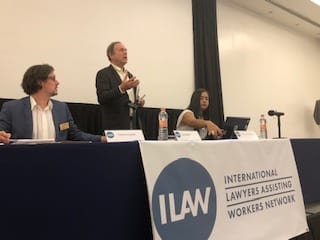“There is a human rights crisis around the world—that’s why we are intensifying our work in recognizing the role labor plays in holding government’s accountable and promoting dignity and equality at work,” said Sandra Coliver from the Open Society Foundation, opening the second day of the International Lawyers Assisting Workers (ILAW) Conference in Mexico City.
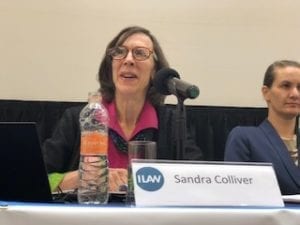
Labor is key to addressing the global crisis in human rights—Sandra Coliver, OSF. Credit: Solidarity Center/Tula Connell
Coliver moderated a panel plenary with representatives from the American Bar Association, the Business and Human Rights Resource Center (BHRRC), Human Rights Watch and the International Commission of Jurists (ICJ) who discussed how their efforts as independent monitors and lawyers provide a key tool for worker rights advocates around the world.
More than 100 worker rights lawyers from around the world are discussing strategies to facilitate innovative litigation, help spread the adoption of pro-worker legislation and defeat anti-worker laws at the first ILAW conference. Participants yesterday discussed identified common challenges, share successes, plan strategic partnerships and more.
Key Allies: Independent Legal & Human Rights Groups
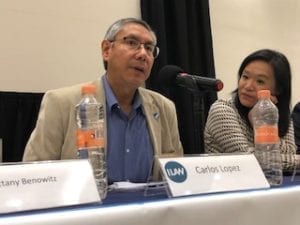
Carlos Lopez says ICJ offers an international lens on human rights abuses. Credit: Solidarity Center/Tula Connell
In Zimbabwe, where ongoing protests against the nation’s economic meltdown have been met with death threats and a sustained government crackdown on union leaders and other civil society members, the ICJ this year documented 800 human rights violations, murders and hundreds of arrests and detentions, many included trade unionists.
ICJ created an emergency fund to provide protection for human rights violations in Zimbabwe, and relocated to safe places people whose houses were targeted and other assistance, said Carlos Lopez at ICJ.
The organization’s fact-finding mission with South African lawyers and others resulted in magistrate courts, made presentations before authorities and prepared a report—and in doing so, “signaled a strong message to labor lawyers activists that there is an international eye on what’s happening—solidarity,” he said.
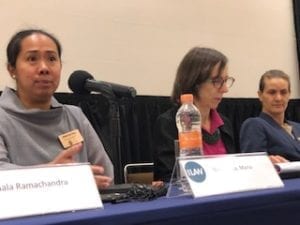
BHRRC investigates up to 100 worker right violations a year, says Bobbi Sta. Maria. Credit: Solidarity Center/Tula Connell
At BHRRC, the organization investigates up to 500 allegations of worker rights and human rights abuses each year and seeks to get companies to respond to the allegations, said Bobbie Sta. Maria.
“We create a public record of allegations against companies, work with unions, using information from the media and push the information out to investors, governments, non-governmental organizations, academics, companies,” and more, she said.
The ABA’s involvement in addressing worker rights and human rights abuses results in “fewer violations and shorter periods of confinement and creates documentation” that the ABA takes to brands to engage local suppliers, said Brittany Benowitz at the ABA.
“Having a bar association as outside observer helps in the larger effort” of achieving worker rights, she said.
ILAW Going Forward
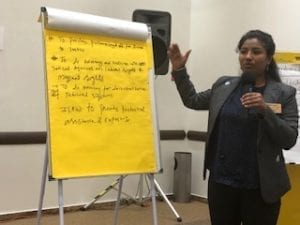 During regional breakouts—Africa, Asia, Europe and Latin America—participants built on discussions over the past day and a half to map out recommendations for ILAW and its members to further craft a network that achieves its founding goals: a global hub for worker rights lawyers to facilitate innovative litigation, help spread the adoption of pro-worker legislation and defeat anti-worker laws.
During regional breakouts—Africa, Asia, Europe and Latin America—participants built on discussions over the past day and a half to map out recommendations for ILAW and its members to further craft a network that achieves its founding goals: a global hub for worker rights lawyers to facilitate innovative litigation, help spread the adoption of pro-worker legislation and defeat anti-worker laws.
Common themes emerged: ILAW members said the network should go deeper in labor law reform and legislation and policy changes, engage in more public statements and advocacy and include migrant worker rights throughout all its advocacy.
The ILAW network should provide technical assistance and support so members can “share information on the migrant worker recruitment system and migration policies to enable unions and other stakeholders in the destination country to assist migrant workers,” said Sabnam Awal from the People’s Forum on Human Rights in Nepal.
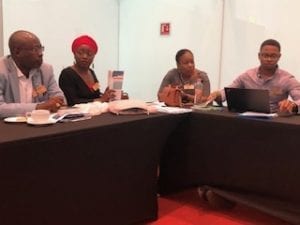
ILAW Conference participants took part in regional breakouts to map next steps. Credit: Solidarity Center/Tula Connell
Members also frequently urged ILAW to go further in helping them address gender equality issues and network around strategies to move ratification of a new global treaty ending gender-based violence at work (International Labor Organization/ILO Convention 190).
ILAW should explore “how to encourage unions to provide an equal and level playing ground free from discrimination for both men and women,” said Kaizala Tembo, from the Labor Institute of Zambia.
Many of the resources members seek are available at the ILAW website, said ILAW Board Chair Jeff Vogt, who reviewed its features in an afternoon plenary in which members shared their priorities for ILAW. The ILAW website is available in seven languages and includes a library of resources, such as legal cases submitted by members for inclusion. ILAW members may join any of the dozens of discussion groups which are organized thematically, such as migrant worker discussion group and regionally.
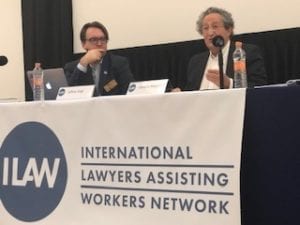
Horacio Meguira led a discussion on worker rights and the ILO. Credit: Solidarity Center/Tula Connell
Vogt, Solidarity Center Rule of Law director, also noted that an urgent action feature will shortly be live that will enable members to react quickly with an online petition.
In the final conference plenary, Horacio Meguira from the Argentina Independent Workers union, shared a history of the ILO and engaged participants in a discussion of how worker rights lawyers can address the recent shift in the organization—comprised of representatives of workers, employers and governments—toward favoring corporate and state policies that endanger worker rights.

